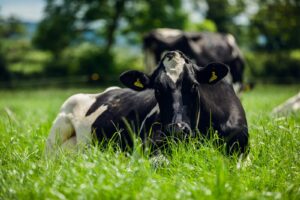The key to green claims: trust and transparency
Repost from Free Range Dairy Network

Right now, we’re all feeling a tight squeeze on our finances, and for many of us every penny counts. Which is why when we make a choice to support sustainable farming, we want to be confident that the increase in price relates to the claims made on the label.
A lot of work goes on behind the scenes to ensure Free Range milk carrying the Pasture Promise logo protects cows’ freedom to graze outdoors on pasture and pay farmers a fair price for their milk.
A recent example of this is Oatly’s claim that “climate experts say cutting dairy and meat products from our diets is the single biggest lifestyle change we can make to reduce our environmental impact”. The Advertising Standards Agency (ASA) the UK’s advertising watchdog banned this high-profile marketing campaign after ruling its green claims were misleading.
This advertising campaign received 109 complaints from members of the public and the campaign group A Greener World and upheld the complaint because “consumers would understand the claim to be a “definitive, objective claim that was based on scientific consensus,” when instead it was the opinion of one climate expert.”
Oatly claimed the “dairy and meat industries emit more CO2 than all the world’s planes, trains, cars, boats etc, combined”. However, when the ASA investigated the claim it found Oatley had “overstated” the emissions of the meat and dairy industry because the company did not take into account emissions covering the full life cycle of transport, only emissions when a vehicle is driven.
It can be seen as a way to ‘trick’ customers into thinking they are making an eco-friendly choice, especially to customers who care about the environment. Regrettably other milk companies are using the words free range on their label without being part of the Free Range Dairy Network scheme or even committing to cows right to graze.
In 2020, the UK’s Competition and Markets Authority (CMA) launched an investigation which found that “40% of green claims made online are misleading”. In response to this, a new anti-greenwash guide for UK businesses has been designed to protect consumers from misleading environmental claims called the Green Claims Code.
A great way to prevent Greenwashing and build trust, is verification by independent third parties. This is why when we designed and copyrighted our Free Range Dairy Network standards they were done with support from NSF International, and all our Free Range Dairy farm audits are performed by SAI Global.
SAI Global is a worldwide renowned organisation that specialises in farm audits, food safety and is an established and trusted leading Agri-Retail Assurance Provider. They operate as an impartial assessor and report back accordingly.
In light of concerns around cows and climate change we have just started working with Alltech E-CO2 . This is to increase efficiency on farms and reduce the carbon footprint. Alltech E-CO2 has its own ‘checks and balances’ in place working with the Carbon Trust to ensure their products and services are independently assessed and internationally verified.
We need this accountability and transparency if we’re to build trust in the milk industry when people ask questions such as ‘Are Cows Killing the Planet?’
I also hope that with transparency we will be able to educate people about what real free range milk means. One of the key standards of Free Range Dairy Network is the right for cows to graze a minimum 180 days a year. Other dairy labels might say free range, but unless they are a member of our scheme and carry the Pasture Promise logo, beware the free range milk Greenwash.
Unlike the copycats, we are not just putting the words free range on milk labels and leaving it at that, we are taking all the feedback from our independent auditors and will continue working with them to build a genuine greener dairy system.
This article was originally published by Free Range Dairy Network.